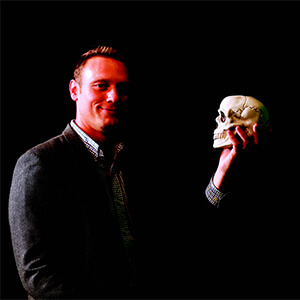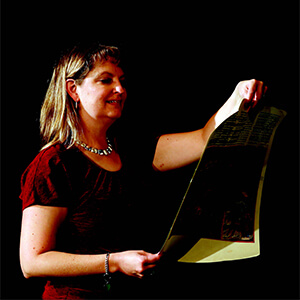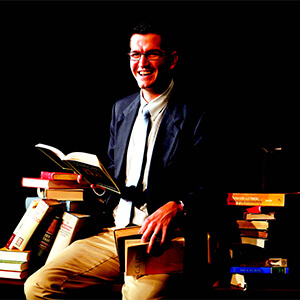
This story first appeared in the fall 2016 issue of the Concordian, the official magazine of Concordia University Wisconsin.
Concordia University Wisconsin has a long heritage as a liberal arts institution and will continue that legacy into the future. The benefits of a liberal arts education are many: strong critical thinking and problem-solving skills, the ability to communicate clearly and effectively, analytical fluency, and an understanding of citizenship — all part of the curriculum in the School of Arts and Sciences. We firmly believe in an education that is multi-disciplinary, addresses topics across time and cultures, emphasizes the importance of scientific literacy, values the humanities as disciplines that can ennoble and enlighten, teaches students to write with purpose and for multiple audiences, and acknowledges the role of faith in the acquisition and application of knowledge.
At CUW, all of our undergraduates benefit from a strong core curriculum and liberal arts foundation. In fact, other programs and majors build on and supplement those foundational skills. By combining the strengths of both the liberal arts and the professional programs, this approach leads to a quality education that prepares students to live and thrive in the 21st century.
However, we live in a time when the value of the liberal arts education is again being questioned in mainstream America, given today’s economic climate. Worries about finding and obtaining a job quickly are leading many to focus more on specific, technical training. But there is a danger that such training reduces us to merely utilitarian beings. I believe the prospect of getting that first job (and future jobs) — in addition to discovering one’s calling, one’s vocation — is enhanced with a liberal arts education. CUW produces graduates who will be agents of change, capable of adapting and thriving in an era of rapid technological progress; and who also make good neighbors.
This mindset is shared by our faculty. At a time when many are questioning the worth of a liberal arts degree, five faculty members offer up their commitment to the approach.
The above opening is written by Dr. Steven Montreal, dean of Concordia University Wisconsin’s School of Arts and Sciences.
 Dr. Brian Harries, Associate Professor of English
Dr. Brian Harries, Associate Professor of English
Years at CUW: 7
Q: Who from your discipline inspires you?
A: Shakespeare. He lived 400 years ago and dealt with the same big questions that we’re still grappling with today. Topics like faith, government, race, gender, and nationality were all common themes in his works. He
asked the big questions and then, through his characters, made them accessible to the average person. He was like a modern movie director. To this day, we can still see ourselves and our problems in his plays.
Q: Once you teach them how to think, there’s no limiting what they do. Knowing that, what is an unexpected job one of your former students went on to do?
A: English majors tend to make great strategists. A number of my former students work in business and content strategy. They’re a diverse group of graduates, who tend to be critical thinkers and can empathize with people because they’ve studied characters, cultures, and ideas. On top of that, people who can write well are in high demand in every industry.
Q: What is a liberal arts stereotype you’d like to debunk?
A: The idea that liberal arts has nothing to do with real life. It’s all real life. Liberal arts is our cumulative knowledge — what we’ve come to know as humans and how we’ve come to know it. It’s an ongoing and multigenerational project, and it’s something we all contribute to.
Liberal arts is the study of the world around us, the study of God who created and redeemed it, and the study of people who live in it. Knowing how all of these intersect allows us to make a positive impact through our lives.
 Dr. Susan Mobley, Professor of History, Department Chair
Dr. Susan Mobley, Professor of History, Department Chair
Years at CUW: 18
Q: Who from your discipline inspires you?
A: I talk about St. Augustine a lot, especially his “Confessions and City of God,” because his view of history is so meaningful for Christians. He emphasized that we are members of two kingdoms: the City of God and the City of Man. That’s the essence of the liberal arts approach: to help students cultivate their gifts, and develop a better understanding of themselves and others. This inspires them to serve in the City of Man and to look joyfully toward the City of God. We need to encourage students to do both.
Q: How do faith instruction and the liberal arts approach intersect?
A: There’s a history of everything. When we study the Renaissance, we talk accounting, and when we talk about Aristotle, we discuss political science. All knowledge is interconnected.
The liberal arts tradition we follow is from a Christian perspective. The ancient Greeks and Romans used liberal arts to prepare people for public service. In the Middle Ages, the primary focus of liberal arts was to prepare clergy for service to the Church. Then the Reformation came along. Luther saw the importance of preparing people for both public service and church work. Luther favored education for the clergy, but he believed that all Christians need to be educated and prepared to help serve the Church in whatever vocation God calls them.
Q: What is a liberal arts stereotype you’d like to debunk?
A: That the study of liberal arts is just the humanities. The liberal arts actually include the sciences, too. So a degree in liberal arts is the “both-and” option. In the liberal arts, students have the opportunity to explore all kinds of disciplines, and this makes them well-rounded and encourages them to be lifelong learners.
 Rev. Jason Lane, Assistant Professor of Theology
Rev. Jason Lane, Assistant Professor of Theology
Years at CUW: 4
Q: Who from your discipline inspires you?
A: My father-in-law was my pastor and a true father in the faith. He was also a magnificent scholar. The parsonage was always filled with books, ceiling to floor. He loved words — above all, God’s Word — and he taught others to love those words, too. So when I was growing up in the parish, there was a culture of learning and knowing things, especially Christ. For me, my pastor modeled learning as a way of life.
Q: As higher education costs continue to rise, some are moving away from a liberal arts approach. Why does it still matter?
A: We’re seeing on a grand scale within the United States the need to defend those things that need no defense. Liberal arts is not a fad. The entire course of Western culture has been shaped by the
approach.
Universities, as well as parents and students, that move away from a liberal arts approach will have to consider what they’re sacrificing. College used to be for bettering one’s self as a human being. Now there are pressures to go to college only to get a job, as quickly and as cheaply as possible. But I believe the school that invests in the liberal arts truly invests in the student by seeking to train their whole person.
The value of that kind of education is a real question that Concordians are going to have to wrestle with, knowing the financial commitment involved. So is a liberal arts education worth it? I believe it is, and the character and quality of our students confirm it.
Q: How do faith and liberal arts intersect?
A: There are two approaches to liberal arts: those who are constantly searching and never finding, and those who are searching and constantly finding. The pagan philosophers pursued truth but were left in doubt about eternal things. Christianity says that this Truth that you’re after has appeared among us, in the flesh. Christ, lying in a feed trough and hanging on a cross, is the same Christ in whom the substance of all things hold together, and this just gives total concreteness to our studies.
 Dr. Don Korte, Chairman of the Department of Natural Sciences
Dr. Don Korte, Chairman of the Department of Natural Sciences
Years at CUW: 22
Q: Who from your discipline inspires you?
A: Francis Collins, a physician-geneticist and director of the National Institutes of Health (NIH), is arguably the premier scientist in the country. He is an evangelical Christian who converted to Christianity from atheism after a patient asked him what he believed in. He is an inspiration for me as to the effectiveness of God’s Word among the finest scientific minds today.
Q: As higher education costs continue to rise, some are moving away from a liberal arts approach. Why does it still matter?
A: Liberal arts promotes lifelong learning. Professional tracks often focus on the latest tools and current best practices, but these necessarily change. People who are educated in the liberal arts learn to become critical thinkers and problem solvers who are better able to adapt in our rapidly changing world.
Q: How are liberal arts evident or manifested in your classroom?
A: Much of biology deals with ethical questions. This is a primary focus of our senior seminar. Last year our focus was the scarcity of fresh water around the globe. Scientists must not only work to solve these types of problems, but they must also be aware of the societal ramifications of their work. Concordia University Wisconsin, with its strong Lutheran tradition of emphasis in the liberal arts, nurtures this awareness.
 Professor Antoinette “Toni” Spencer, Assistant Professor of Computer Science
Professor Antoinette “Toni” Spencer, Assistant Professor of Computer Science
Years at CUW: 2
Q: Who from your discipline inspires you?
A: I know this probably sounds cliché, but I would have to say Steve Jobs. He took an idea and ran with it. He inspired me to be great, innovative, creative, and determined. Having an innovative mindset like that, I think, doesn’t come without having an analytic and curious mind, and that’s the goal of a liberal arts education — to train people who can innovate.
Q: As higher education costs continue to rise, some are movingaway from a liberal arts approach. Why does it still matter?
A: A liberal arts degree provides students with a solid, well-rounded education. Understanding a broad range of disciplines allows students to become effective members in society and in the workplace. They
learn to think, analyze, strategize, and assess risks before they respond to a situation. The institutions that teach students only “how” to do something lose the true understanding and reasoning as to why something happened, and why the solution chosen works best. It’s not just about knowing how to do something, it’s why, and liberal arts provides that.
Q: What is a liberal arts stereotype you’d like to debunk?
A: Computer science is all about creating tools and devices that are
helpful to people. In order to truly help people, we need to have a better understanding of people — how they operate, what motivates them, what their needs are. That understanding comes from learning a broad array of subjects and topics. A liberal arts education teaches people not just the technical skills but how to think beyond, how to problem solve. What good is knowing how to fix something if you can’t understand the
problem that needs to be solved in the first place?
The fall Concordian hit mailboxes October 1, 2016. View the PDF version of the magazine here. If you are not on our mailing list, but are interested in receiving a free copy, call 262-243-4333.
— This story is written by Kali Thiel, director of university communications for Concordia University Wisconsin and Ann Arbor. She may be reached at kali.thiel@cuw.edu or 262-243-2149.
If this story has inspired you, why not explore how you can help further Concordia's mission through giving.